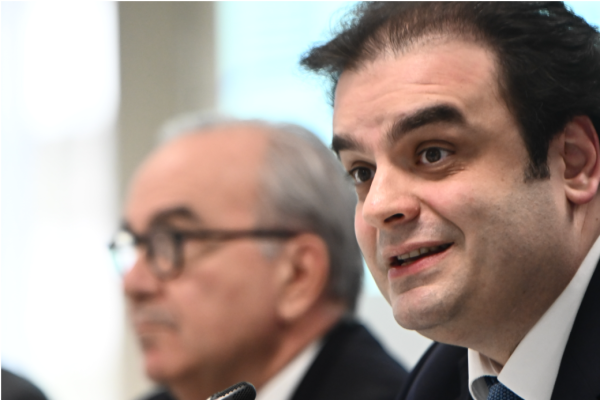
The new challenges households are facing, due to high inflation and the pressures on their disposable income, the forthcoming increase in European Central Bank (ECB) interest rates and the rise in real estate prices are at the heart of the budget of each family.
In the Financial Stability Review, the Bank of Greece (BoG) provides answers to a number of issues that concern households and assesses the real risk for a number of issues, taking a look back from 2021 to today.
Interest rate risk for households
Mortgage rates are expected to remain low for the whole of 2022, having only a small effect on the cost of servicing household debt.
Extremely low lending rates have made it easier for households to meet their debt obligations, in 2021, and to avoid negative effects on the stability of the financial system. Interest expenses as a percentage of gross disposable income of households decreased further, due to the reduction of mortgage and consumer loan balances, but also the reduction of interest costs on housing loans. During the first quarter of 2022, the weighted average interest rate of all existing loans remained almost unchanged at 3.5%, according to the BoG.
In particular, the average interest rate on existing mortgage balances over five years and the corresponding interest rates on consumer and other loans to individuals and private non-profit institutions remained virtually unchanged at 1.9% and 6.3%, respectively.
According to the BoG, the easing of the accommodative stnace of the Eurosystem’s monetary policy is expected in the medium term, taking into account the recent increase of inflationary pressures. However, mortgage rates are expected to remain low for the whole of 2022, with only a small effect on the cost of servicing household debt.
Income risk for households
Disposable income will be challenged in 2022 however, there are factors that still have a positive impact.
The evolution of disposable income of households is a key determinant of the relative ease of servicing their loan obligations. According to provisional data from the Hellenic Statistical Authority (ELSTAT), gross disposable income rose from 118.7 billion euros, in 2020, to 125.6 billion euros, in 2021, an increase of 5.8%. It is noted that household income was boosted by fiscal measures to address the pandemic, totaling about 2 billion euros for 2021, which also helped protect employment and reduce unemployment.
According to the BoG, real Gross Domestic Product (GDP) increased by 8.3%, in 2021, compared to the previous year, offsetting much of the sharp decline observed in 2020. Final consumption expenditure of households increased significantly by 8.9%, in 2021, compared to 2020. The unemployment rate decreased significantly from 16.3%, in 2020, to 14.7%, in 2021, with employment prospects remaining positive mainly due to the lifting of restrictions and the gradual return to normal operation of businesses. Household income support is also reflected in the increase in deposits observed in 2021, albeit at a slower pace compared to 2020.
“Pressures”
Regarding the pressures on household income, the harmonized index of consumer prices (HICP) recorded a positive growth rate and stood at 0.6%, in 2021, after the decline in 2020 (-1.3%). In addition, since the beginning of 2022, there has been a resurgence of inflation (increase by 9.1%, in April 2022, compared to April 2021) due to significant increases in food prices, transport and energy costs, but also due to the disruption of global supply chains. The recent Russian invasion of Ukraine has exacerbated inflationary pressures through rising energy prices and the spread of price increases on all goods and services. Overall, it is becoming clear that, for 2022, household disposable income will face some difficulties due to the withdrawal of most fiscal support measures, inflationary pressures and geopolitical developments that cause uncertainty in consumer and investment decisions. However, the BoG estimates that there are factors that continue to have a positive impact, which is reflected in the growth rate of the Greek economy projected for 2022 and the strengthening of employment by the resilience of individual sectors, such as construction activity and exports.
House price risks
Expectations for the Greek real estate market remain positive and prices are still far from the historic high levels.
The growth rate of apartment prices accelerated in 2021 to 7.1% on an annual basis, compared to 4.5%, in 2020. In fact, in the fourth quarter of 2021, apartment prices for the whole country increased by 9.1% compared to the corresponding quarter of 2020. For 2021, the highest annual rate of price increase is presented by the newly built apartments compared to the old ones, where increases of 7.4% and 6.9% were recorded, respectively. The analysis of the data by geographical area shows that the largest increase was recorded, for the whole of 2021, in Athens (9.1%).
Instability
According to the BoG, despite the instability of the last two years, due to the pandemic and the recent increase in energy costs, construction costs and the effects of the war in Ukraine, expectations for the Greek real estate market remain positive. On the one hand, the very good course of tourism and, on the other hand, the prospect of alleviating geopolitical instability in a reasonable period of time, maintain the positive medium-term and long-term expectations, which is reflected in the values and the relatively low returns of real estate income. Although the European Commission’s recommendation to restrict residence permits for investors (gold visa or gold passport) may have a partial effect on demand, it is estimated that investment interest will remain strong especially for certain privileged positions in the Attica basin and in tourist areas. In addition, it is pointed out that prices are still significantly different from the historical high recorded before the financial crisis.
Based on the apartment price index compiled by the Bank of Greece for the whole country, the highest price of the index was observed in 2008 (101.7) and then followed a steady downward trend, to record the lowest price in 2017 ( 59). Since then, the apartment price index has been steadily rising, reaching 72.1, in 2021.
Latest News

Servicers: How More Properties Could Enter the Greek Market
Buying or renting a home is out of reach for many in Greece. Servicers propose faster processes and incentives to boost property supply and ease the housing crisis.

Greek Easter 2025: Price Hikes on Lamb, Eggs & Sweets
According to the Greek Consumers’ Institute, hosting an Easter dinner for eight now costs approximately €361.95 — an increase of €11 compared to 2024.

FM Gerapetritis Calls for Unified EU Response to Global Crises at EU Council
"Europe is navigating through unprecedented crises — wars, humanitarian disasters, climate emergencies," he stated.

Holy Week Store Hours in Greece
Retail stores across Greece are now operating on extended holiday hours for Holy Week, following their Sunday opening on April 13. The move aims to accommodate consumers ahead of Easter, but merchants remain cautious amid sluggish market activity.

Green Getaway Ideas for Easter 2025 in Greece
Celebrate Easter 2025 in Greece the sustainable way with eco-farms, car-free islands, and family-friendly getaways rooted in nature and tradition.

Civil Protection Minister Details Summer Firefighting Plans at Delphi Forum
At the 10th Delphi Economic Forum, Minister of Climate Crisis and Civil Protection Yiannis Kefalogiannis discussed Greece's plans for the upcoming fire season.

How Shops and Markets Will Operate During Easter Holy Week
The Easter holiday schedule has been in effect since April 10, with retail stores open Palm Sunday, and most supermarkets also operating to meet consumer demand for Easter shopping

Why Is the French Aircraft Carrier Charles De Gaulle in Piraeus?
Docking in Piraeus after a four-month deployment in the Indo-Pacific region, the admiral of the aircraft carrier the Charles de Gaulle says, "Greece is our best partner in the Mediterranean."

Riots and Vandalism in Downtown Athens Exarcheia Region
Night of unrest in downtown Athens' region of Exarcheia – 11 Cars Burned, 72 Detentions

Truth Team: Is the PM and his team telling the truth, the whole truth and nothing but the truth?
The Greek government spokesman noted that "a private individual received payment from other private individuals, and for some people this is a horrifying revelation."







































 Αριθμός Πιστοποίησης
Αριθμός Πιστοποίησης